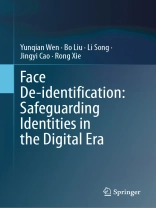This book provides state-of-the-art Face De-Identification techniques and privacy protection methods, while highlighting the challenges faced in safeguarding personal information. It presents three innovative image privacy protection approaches, including differential private k-anonymity, identity differential privacy guarantee and personalized and invertible Face De-Identification. In addition, the authors propose a novel architecture for reversible Face Video De-Identification, which utilizes deep motion flow to ensure seamless privacy protection across video frames.
This book is a compelling exploration of the rapidly evolving field of Face De-Identification and privacy protection in the age of advanced AI-based face recognition technology and pervasive surveillance. This insightful book embarks readers on a journey through the intricate landscape of facial recognition, artificial intelligence, social network and the challenges posed by the digital footprint left behind by individuals in their daily lives. The authors also explore emerging trends in privacy protection and discuss future research directions.
Researchers working in computer science, artificial intelligence, machine learning, data privacy and cybersecurity as well as advanced-level students majoring in computers science will find this book useful as reference or secondary text. Professionals working in the fields of biometrics, data security, software development and facial recognition technology as well as policymakers and government officials will also want to purchase this book.
Table of Content
Introduction.- Facial Recognition Technology and the Privacy Risks.- Overview of Face De-identification Techniques.- Face Image Privacy Protection with Differential Private k-anonymity.- Differential Private Identification Protection for Face Images.- Personalized and Invertible Face De-identification.- High Quality Face De-identification with Model Explainability.- Deep Motion Flow Guided Reversible Face Video De-Identification.- Future Prospects and Challenges.- Conclusion.
About the author
Yunqian Wen received the B.S. degree from Beihang University, China, in 2018. She received Ph.D. degree from the Department of Electronic Engineering, Shanghai Jiao Tong University, China, in 2023. She is currently an engineer at the Shanghai Aerospace Electronic and Communication Equipment Research Institute. Her research interests include image privacy, privacy protection, and computer vision.
Bo Liu received his Ph D. degree from the Department of Electronic Engineering, Shanghai Jiao Tong University, Shanghai, China in 2010. He is currently an Associate Professor at the University of Technology Sydney, Australia. His research interests include cybersecurity and privacy, location privacy and image privacy, privacy protection and machine learning, wireless communications and networks. He is an IEEE Senior Member and Associate Editor of IEEE Transactions on Broadcasting.
Li Song received the B.E. and M.S. degrees in engineering and the Ph.D. degree in electrical engineering from Shanghai Jiao Tong University (SJTU) in 1997, 2000, and 2005, respectively. He joined SJTU as a Faculty Member and is currently a Full Professor with the Department of Electronic Engineering. He was also a Visiting Professor with Santa Clara University from 2011 to 2012. His research interests include video processing and multimedia systems. He was a recipient of the National Science and Technology Progress Award in 2015, the Okawa Foundation Research Grant in 2012, the Best Paper Award of the IEEE Circuits and Systems Society Visual Signal Processing and Technical Committee (IEEE CASS VSPCTC) in 2022, the Second Place Award from IEEE ICME-Twitch Grand Challenge in 2017, the Best 10% Paper Award from the IEEE VCIP in 2016, and the Best Paper Award from the International Conference on Wireless Communications and Signal Processing in 2010. He is an IEEE Senior Member and has been serving as an Associate Editor for Multidimensional Systems and Signal Processing from 2012 to 2018 and a Guest Editor for the IEEE Transactions on Broadcasting, special issue on quality of experience for advanced broadcast services in 2018.
Jingyi Cao received the B.E. degree from Shanghai Jiao Tong University, China, in 2021, where she is currently pursuing the master’s degree with the Department of Electronic Engineering. Her research interests include image privacy, computer vision, and machine learning.
Rong Xie received the bachelor’s and master’s degrees in electrical engineering from Northeast Dianli University, Jilin, China, in 1996 and 1999, respectively, and the Ph.D. degree in electrical engineering from Zhejiang University in 2002. She joined Shanghai Jiao Tong University as an Assistant Professor in 2002, where she is currently an Associate Professor with the Department of Electronic Engineering. Her research interests are in the areas of video coding and image processing.












